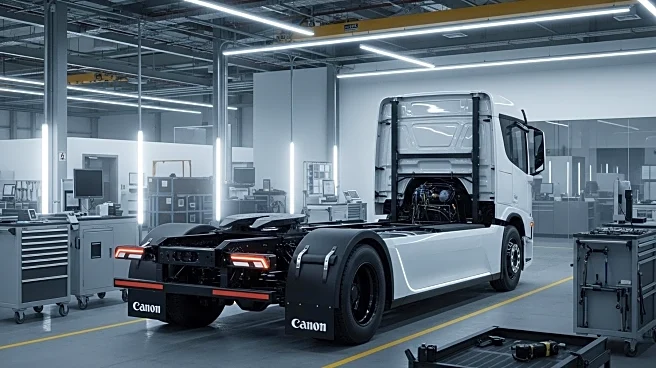What is the story about?
What's Happening?
Traton, a subsidiary of Volkswagen, is significantly increasing its production of electric trucks to meet the growing demand for zero-emission vehicles. The company, which includes brands like Scania, MAN, and International, has seen a notable rise in sales of its electric models, selling 1,250 units globally in the first half of 2025, doubling its sales from the previous year. Traton is also enhancing its infrastructure by installing hundreds of publicly available chargers across Europe through a partnership called Milence. These chargers are capable of delivering over 1 megawatt of power, allowing heavy-duty trucks to recharge in 45 minutes or less. This expansion is part of Traton's strategy to transition from conventional fossil fuel trucks to electric vehicles, with new production lines capable of assembling both electric and diesel trucks.
Why It's Important?
The shift towards electric trucks is crucial in reducing greenhouse gas emissions from the freight industry, which accounts for about 8% of global emissions. With road freight demand expected to triple by 2050, transitioning to electric vehicles is essential for environmental sustainability. Traton's efforts to increase production and infrastructure for electric trucks could significantly lower emissions, as battery-electric trucks in Europe currently reduce emissions by 63% compared to diesel trucks. This move not only positions Traton as a leader in the electric vehicle market but also supports global efforts to combat climate change. The success of such initiatives could influence other manufacturers and industries to adopt similar sustainable practices.
What's Next?
Traton's continued investment in electric vehicle technology and infrastructure is likely to spur further advancements in the industry. As production costs decrease and charging infrastructure becomes more widespread, electric trucks could become more accessible and appealing to a broader range of consumers and businesses. This could lead to increased competition among manufacturers, driving innovation and potentially leading to more efficient and cost-effective electric vehicles. Additionally, regulatory pressures and consumer demand for sustainable options may accelerate the transition to electric trucks, influencing policy decisions and market dynamics in the transportation sector.
Beyond the Headlines
The transition to electric trucks also raises questions about the environmental impact of battery production and the source of electricity used to power these vehicles. While electric trucks offer significant emission reductions, the mining and manufacturing processes for batteries can have environmental consequences. The sustainability of electric trucks will depend on the development of cleaner battery technologies and the increased use of renewable energy sources. This shift also highlights the need for comprehensive policies and investments in renewable energy infrastructure to maximize the environmental benefits of electric vehicles.















